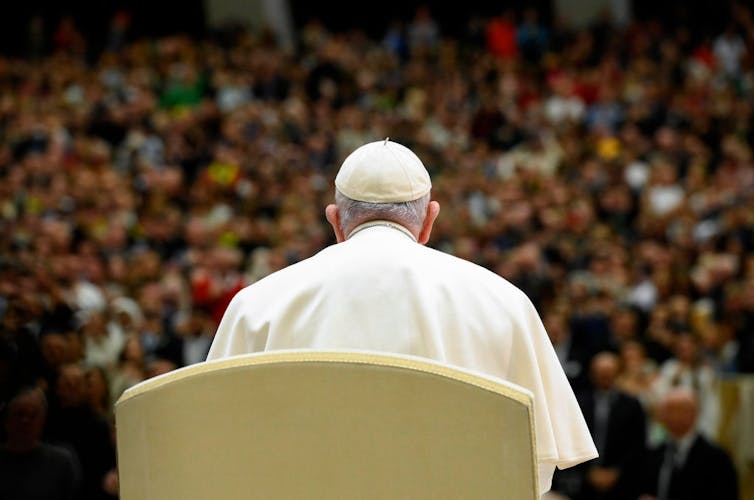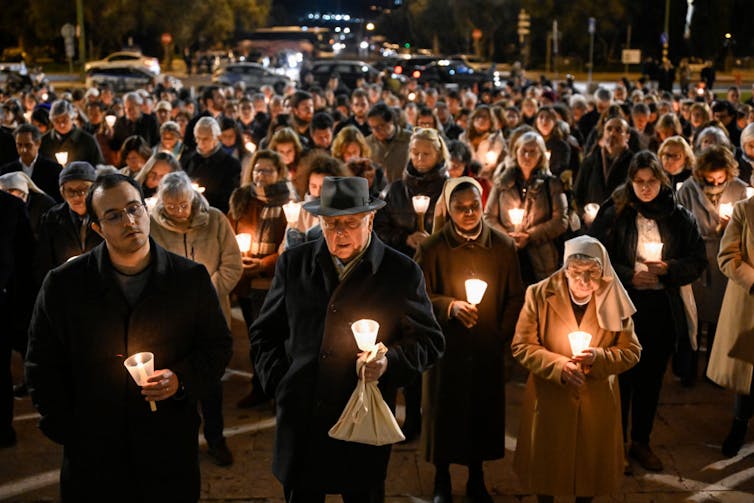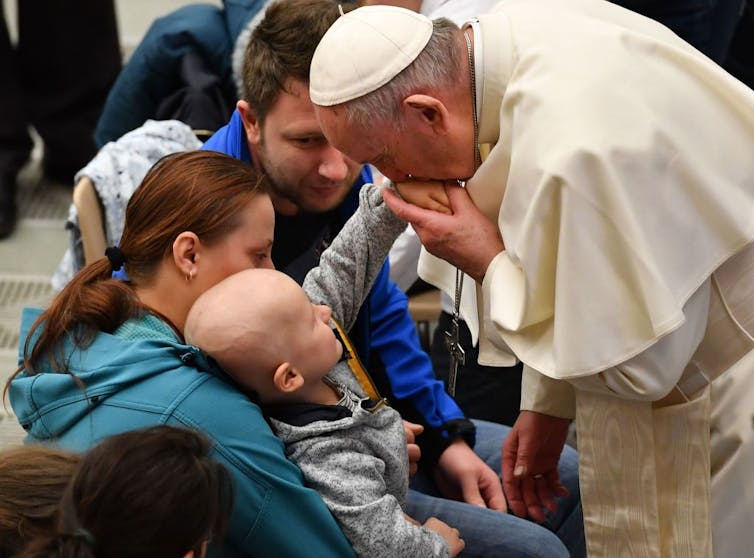
Francis is the first Jesuit pope – here’s how that has shaped his 10-year papacy

Timothy Gabrielli, University of Dayton
Since Jorge Mario Bergoglio first stepped onto the balcony of St. Peter’s Basilica as Pope Francis on March 13, 2013, he has made no shortage of statements that attract attention. “Who am I to judge?” he famously said about gay priests. “Nowadays there is an economy that kills,” he once declared – a comment that led critics to rather implausibly label the pontiff a Marxist.
As the Argentinian pope approaches the 10th year of his papacy, his positions on issues deemed “political” still make their way into headlines. But as is the nature of headlines, the framework from which his positions emerge isn’t always apparent.
As a researcher of Catholicism, I’d like to shed some light on a common pattern in Pope Francis’ writings. It’s a pattern that I believe is rooted in the pope’s spirituality as a Jesuit – a member of the Society of Jesus – a Catholic religious order founded by St. Ignatius Loyola in the 16th century.
Saint’s legacy
The “Spiritual Exercises,” written by St. Ignatius, is a guide to spiritual development that Jesuits and others have used for centuries. It encourages participants to pay careful attention to the inner movements of the spirit or soul that shape their decisions and actions.
The goal of the step-by-step exercises is to recognize oneself as a sinner, but – crucially – a sinner loved by God. A “spiritual director” helps the participant first to recognize brokenness in their life, then to perceive God’s love by contemplating the life of Jesus. Ultimately, the exercises lead people to deepen their relationship with Christ, so that they may discern how best to make decisions.
Like a spiritual director, Francis’ first step is often to acknowledge a “presenting problem,” as a doctor might say: the symptom or apparent issue that is bothering someone. He then eliminates superficial solutions that don’t address the underlying “disease,” before calling for a more fundamental change.
In 2018, for example, U.S. bishops were set to vote on two proposals related to clerical sex abuse: a code of conduct for clerics and new review boards to evaluate bishops’ conduct. Commentators from all quarters howled when Francis halted the vote.

Instead, he insisted that the bishops go on a religious retreat. The Church’s credibility had been “undercut and diminished,” he warned. Francis called on them to relearn how to relate to one another, and to lay Catholics, by spending time in prayer with the gospels, so that they would focus less on “pointing fingers” and more on “seeking paths of reconciliation.”
Without that more fundamental change, Francis wrote, codes and boards could merely be about meeting corporate-style “standards of functionalism and efficiency,” and the call to fundamentally mend relationships would go unheeded. Policies might indeed be necessary, but not before the bishops reminded themselves of their fundamental task to follow Jesus in building relationships with one another and laity.
Several months afterward, the group adopted new rules for oversight of bishops. Critics argued the reforms did not go far enough, however, particularly in terms of involving lay people or law enforcement.
Going to the root
Yet the 2018 episode underscores a broader theme of Francis’ papacy: When accompanying a person, the church or even the whole world on a spiritual journey, pointing out problems and tinkering with surface-level solutions is never going to be good enough. What’s needed, he insists, is a cure for a deeper malaise.
As he said early in his papacy, describing the mission of the church today, “I see the church as a field hospital after battle. It is useless to ask a seriously injured person if he has high cholesterol and about the level of his blood sugars! You have to heal his wounds.”
In Francis’ eyes, both the church and society are wounded, and the church does not stand apart from the world’s problems – in fact, it must not, because it is Christ’s ongoing presence on earth. But both must acknowledge their deeper sources of brokenness in order to find true solutions.

This ethos is apparent in Francis’ approach to one of the most pressing problems today: climate change. In 2015, he issued the first papal document dedicated exclusively to ecological degradation. It begins, said a key adviser to Francis, with “a spiritual listening to the results of the best scientific research on environmental matters available today,” which demonstrates that our environmental situation is bad and getting worse.
That’s the presenting problem. A superficial response is purely technological: Humans can gain ever greater control over the natural world and its changes. The structures resulting from that vision of domination stand at the root of environmental degradation because technology alone will always come up short, Francis argued.
To perceive the proper place of technological innovation, the world needs an “ecological conversion,” he wrote – a spiritual shift so that people perceive how “everything is connected,” from honeybees and supply lines to compost and impoverishment.
This idea comes from the New Testament, he said, which narrates Jesus’ “tangible and loving relationship with the world.” In the pope’s interpretation, because everything hangs together in Christ, the source of all creation, everything is interconnected. Indeed, the pope’s attention to interconnectedness and healing seems to guide his views on everything from homosexuality to economic inequality.
Spiritual director in chief
A few months into Francis’ papacy, an interviewer asked, “Who is Jorge Mario Bergoglio?”
“A sinner,” he replied, echoing Ignatius’ “Spiritual Exercises.”
After decades of practicing Jesuit spirituality, Francis has now spent 10 years as pope applying those practices to a much larger audience, reflecting on the deeper roots of brokenness in the world – and urging people toward fundamental change.![]()
Timothy Gabrielli, Gudorf Chair in Catholic Intellectual Traditions, University of Dayton
This article is republished from The Conversation under a Creative Commons license. Read the original article.















